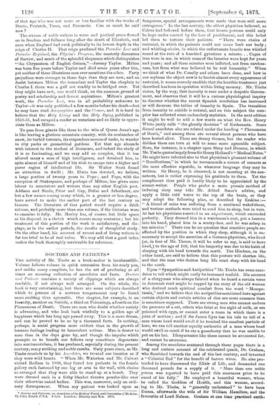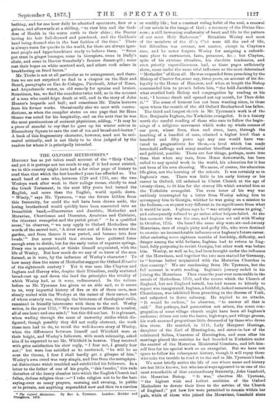DOCTORS AND PATIENTS.*
THE activity of Mr. Timbs as a book-maker is inexhaustible. Volume follows volume in quick succession from his ready pen, and unlike many compilers, he has the art of producing at all times an amusing collection of anecdotes and facts. Doctors said Patients contains a variety of clippings which are always readable, if not always well arranged. On the whole, the book is very entertaining, but there are some subjects described which to persons of a nervous temperament may be found more exciting than agreeable. One chapter, for example, is on Insanity, another on Suicide, a third on Poisonings, a fourth on the Phenomena of Death. There are men who doubt whether society is advancing, and who look hack wistfully to a golden age of happiness which has long ago passed away. This is a mere dream, and can be proved to be so by a thousand facts. In nothing, perhaps, is social progress more evident than in the growth of humane feelings leading to benevolent actions. Man is dearer to man than in the days gone by, and though the impulse which prompts us to benefit our fellows may sometimes degenerate into sentimentalism, it has produced, especially during the present century, many striking and noble results. Sixty years since, as Mr. Timbs reminds us by his Anecdotes, we treated our lunatics as if they were wild beasts. " When Mr. Waterton and Mr. Calvert visited Bedlam in 1808, they found ten patients in the female gallery each fastened by one leg or arm to the wall, with chains so arranged that they were able to stand up at a bench. They were dressed each in a filthy blanket thrown poncho-like over their otherwise naked bodies. This was, moreover, only an ordi- nary derangement. When any patient was looked upon as • Doctors and Patients; or, sttascdotes qf ths Medical World. and Cen-laciffia of Medicine. By John Timbs, F.S.A. 7 Tole. London: Bentley and Son. 1873. dangerous, special arrangements were made that were still more outrageous." In the last century, the ablest physician believed, as Celsus had believed before them, that insane persons could only be kept under control by the fear of punishment, and this belief led them to torture their patients. " There were chairs of restraint, in which the patients could not move limb nor body ; and whirling-chairs, in which the unfortunate lunatic was whirled round at the rate of a hundred gyrations a minute... Cages of iron were in use, in which some of the lunatics were kept for years and years; and all these miseries were inflicted, not from careless- ness, but from what was believed to be real humanity." When we think of what Dr. Conolly and others have done, and how in our asylums the object now is to banish almost every appearance of restraint, it seems scarcely credible that the horrible treatment just described has been in operation within living memory. Mr. Timbs states, by the way, that insanity is rare under a despotic Govern- ment, and observes that it will be a curious physiological inquiry to discover whether the recent Spanish revolution has increased or will decrease the tables of insanity in Spain. The transition from insanity to suicide is natural, and on this subject the com- piler has collected some melancholy statistics. In the next edition it might be well to add a few words on what the Rev. Henry White justly calls " the ghastly doctrine " of Euthanasia. Some dismal anecdotes also are related under the heading " Phenomena of Death," and among them are several about persons who have been buried alive. These are dreary themes, but the reader who dislikes them can turn at will to some more agreeable subject. Here, for instance, is a chapter upon Sleep and Dreams, in which Mr. Timbs quotes largely from Sir Henry Holland's " Medical Notes." He might have referred also to that physician's pleasant volume of "Recollections," in which he recommends a course of sonnets as the most effective soporific, in whatever language they may be written. Sir Henry, be it observed, is not sneering at the son- neteers, but is rather expressing his gratitude to them. Yet the compliment thus paid is hardly likely to be appreciated by the sonnet-writer. People who prefer a more prosaic method of inducing sleep may take Mr. Alfred Smee's advice, and apply a little cold water to the top of the brain, or they may adopt the following plan, as described by Erskine :- " A friend of mine was suffering from a continual wakefulness, and various methods were tried to send him to sleep, but in vain. At last his physicians resorted to an experiment, which succeeded perfectly. They dressed him in a watchman's coat, put a lantern into his hand, placed him in a sentry-box, and he was asleep in ten minutes." There can be no question that sensitive people are affected by the position in which they sleep, although it is un- necessary to accept the assertion of a German physician, who lived (or, in fear of Mr. Thorns, it will be safer to say, is said to have lived,) to the age of 109, that his longevity was due to his habit of sleeping with his head towards the north. The Hindoos, on the other hand, are said to believe that this posture will shorten life, and that the man who desires long life must sleep with his head to the south.
Upon "Sympathies and Antipathies" Mr. Timbs has some anec- dotes to tell which might easily be increased tenfold. His account of a clergyman who always fainted when he heard a certain verse in Jeremiah read might be capped by the story of the old woman who derived much spiritual comfort from the word "Mesopo- tamia," and we believe that the antipathies mentioned here against certain objects and certain articles of diet are more common than is sometimes supposed. There are strong men who cannot endure the presence of a cat, others who faint at the sight of milk, or are poisoned with eggs, or cannot enter a room in which there is a joint of mutton ; and if Sir James Eyre has his tale to tell of a man whose head would swell if ho touched the smallest particle of hare, we can tell another equally authentic of a man whose head would swell so much if he ate a gooseberry that he was unable to put on his hat. Idiosyncrasies like these cannot be accounted for, and cannot be overcome.
Among the anecdotes scattered through these pages there is a long and curious account of the celebrated quack, Dr. Graham, who flourished towards the end of the last century, and invented a " Celestial Bed " for the benefit of barren wives. He also pre- tended to have discovered the Elixir of Life, and demanded one thousand pounds for a supply of it. "More than one noble person was reported to have paid this enormous price to be cured of his folly." He employed a beautiful woman, whom he called the Goddess of Health, and this woman, accord- ing to Mr. Timbs, is "generally understood" to have been Emma, afterwards the wife of Sir William Hamilton, and the favourite of Lord Nelson. Graham at one time practised earth-
bathing, and for one hour daily he admitted spectators, first at a guinea, and afterwards at a shilling, "to view him and the God- dess of Health in the warm earth to their chins ; the Doctor having his hair full-dressed and powdered, and the Goddess's head being dressed also in the best fashion of the time." There is always room for quacks in the world, for there are always igno- rant people and hypochondriacs ready to believe them. " Some put trust in ginger lozenges, some in hierapicra, some in Daffy's elixir, and some in Doctor Somebody's famous dinner-pill ; some rest their hopes on white mustard seed, and others seek solace in breakfasting on fried bacon."
Mr. Timbs is not at all particular as to arrangement, and there- fore we are not surprised to find in a chapter on the Hair and Beard,.paragraphs on Eau de Cologne, Patchouli, Attar of Roses, and Arquebusede water, an old remedy for sprains and bruises. Sometimes, too, we find the anecdotes twice told, as in the account of a man who could feign death at will, and in the story of John Hunter's leopards and bull ; and sometimes Mr. Timbs borrows from his former works. Occasionally also we meet with contra- dictions, as when the compiler states on one page that Sir Hans Sloane was noted for his hospitality, and on the next that he was the most parsimonious of eminent physicians, adding, "It may be a piece of scandal to say that he gave up his winter soirees in Bloomsbury Square to save the cost of tea and bread-and-butter." A book of this fragmentary character, however, need not be esti- mated critically, and is not likely to be thus judged of by the readers for whom it is principally intended.































 Previous page
Previous page